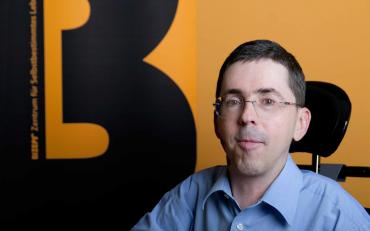A Successful Advocacy in Austria: Interview with Martin Ladstätter
Photo credits: BIZEPS
Martin Ladstätter is a founding member and chairmen of BIZEPS - Center for Independent Living. This counselling centre for persons with disabilities exists in Vienna, Austria since 1992. In his interview with Light For The World team, he explains how Austrians with disabilities lead successful advocacy to include persons with disabilities in vaccination plans of their government. He also shares some of the remaining barriers.
How did it come about that people with disabilities were prioritized in Austria’s vaccination plans?
At first, unfortunately, only elderly people in nursing homes were considered a priority when determining the vaccination sequence. We had to do a lot of persuasion in the health administration to make them understand: people with disabilities with high support needs who live at home also need to be vaccinated quickly. The starting point was people using personal assistance. We also initiated a series of media reports (TV, radio, newspapers) until politicians became aware of the importance of the topic.
What was the role of BIZEPS and other self-advocates?
Even in “normal times” participation does not always take place. And the needs of people with disabilities are easily overlooked, particularly in times of crisis. Our role is then to loudly draw attention to ourselves. It is similarly important to continuously offer cooperation to overcome difficulties. It was also helpful that we tried to foresee what challenges we would face in the coming weeks so that we could plan ahead our actions.
You have been vaccinated, can you tell us about your experience? Have you found the registration process, information, and venue accessible? Do you feel like you really agreed to the vaccine?
I received my first vaccination on February 17, 2021, by travelling to a vaccination venue. The location was wheelchair accessible and the process very well organized - especially for the needs of people with disabilities. Signing up was easy. But unfortunately, different regions in Austria use different platforms to provide information on the vaccines – and not all of them are accessible for blind people and those with visual impairments. Hopefully, this will be improved. In Austria, you cannot choose the vaccine. It is a medical decision which vaccine to receive.
Has everything been resolved? In your opinion, what obstacles could prevent you or people with disabilities like you from accessing vaccinations like other people?
People with disabilities who cannot leave their own home will not be vaccinated until the next few weeks. There are not yet plans available everywhere in Austria for how this will be organized. It is currently difficult to estimate when people with disabilities will be vaccinated in their own homes. In some parts of Austria, there are no clear time schedules yet.
What are your worries and hopes for the future if the COVID-19 pandemic continues?
It is important that as many people with disabilities as possible can get adequate information about why vaccination is so important. Texts in Easy-to-read already exist, but they are certainly not yet widely known. It is also important that plans are prepared everywhere in Austria so that people with disabilities can get access to vaccinations without barriers.
People with adult representation need a lot of support to be able to inform themselves in an uninfluenced and appropriate form and to then be able to decide whether they want to get vaccinated or not.
It will also be important to develop strategies for how to best bring the facilities for people with disabilities out of crisis mode again.
>>Learn more about Persons with Disabilities and Access to COVID-19 vaccination here.

